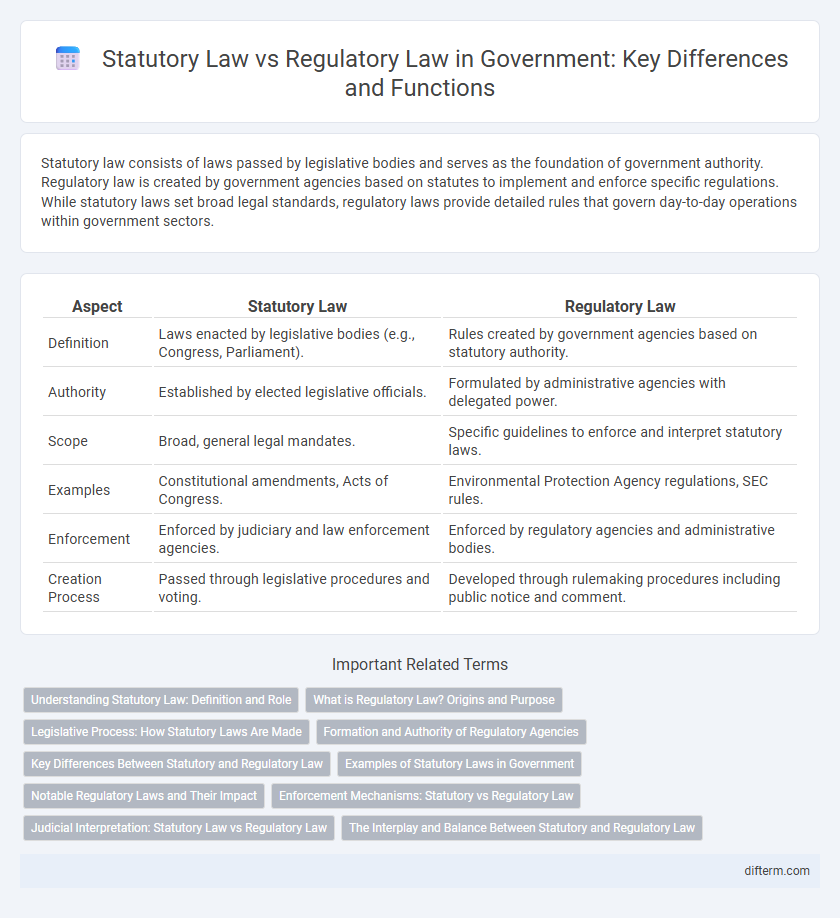Statutory law consists of laws passed by legislative bodies and serves as the foundation of government authority. Regulatory law is created by government agencies based on statutes to implement and enforce specific regulations. While statutory laws set broad legal standards, regulatory laws provide detailed rules that govern day-to-day operations within government sectors.
Table of Comparison
| Aspect | Statutory Law | Regulatory Law |
|---|---|---|
| Definition | Laws enacted by legislative bodies (e.g., Congress, Parliament). | Rules created by government agencies based on statutory authority. |
| Authority | Established by elected legislative officials. | Formulated by administrative agencies with delegated power. |
| Scope | Broad, general legal mandates. | Specific guidelines to enforce and interpret statutory laws. |
| Examples | Constitutional amendments, Acts of Congress. | Environmental Protection Agency regulations, SEC rules. |
| Enforcement | Enforced by judiciary and law enforcement agencies. | Enforced by regulatory agencies and administrative bodies. |
| Creation Process | Passed through legislative procedures and voting. | Developed through rulemaking procedures including public notice and comment. |
Understanding Statutory Law: Definition and Role
Statutory law consists of laws enacted by legislative bodies, serving as the foundational legal framework for governance. It provides clear, codified rules that define rights, duties, and procedures applicable to individuals and institutions within a jurisdiction. Statutory law plays a crucial role in establishing public policy and ensuring legal consistency across regulatory practices.
What is Regulatory Law? Origins and Purpose
Regulatory law consists of rules and regulations created by government agencies to enforce statutes enacted by legislatures. Originating from the need to manage complex societal and economic issues beyond the capacity of general laws, regulatory law ensures compliance, safety, environmental protection, and fair market practices. Its primary purpose is to implement legislative intent through detailed standards, monitoring, and enforcement mechanisms tailored to specific sectors or activities.
Legislative Process: How Statutory Laws Are Made
Statutory laws are created through a formal legislative process involving proposal, committee review, debates, and voting in legislative bodies such as Congress or state legislatures. Once a bill passes both chambers and receives executive approval, it becomes statutory law, codifying legal requirements and prohibitions. In contrast, regulatory laws are developed by administrative agencies empowered by statutes to implement and enforce broad legislative mandates through detailed rules and regulations.
Formation and Authority of Regulatory Agencies
Statutory law originates from legislative acts passed by Congress or state legislatures, establishing the legal framework and empowering regulatory agencies. Regulatory law is created by these agencies through rulemaking processes authorized by statutes, allowing agencies to interpret and enforce laws within their specific jurisdictions. The authority of regulatory agencies is derived directly from enabling statutes that define their scope, powers, and limitations.
Key Differences Between Statutory and Regulatory Law
Statutory law consists of laws enacted by legislative bodies such as Congress or state legislatures, establishing legal standards and mandates. Regulatory law is created by government agencies authorized to implement and enforce statutes, providing detailed rules and guidelines within the framework of statutory law. The key difference lies in statutory law setting broad legal principles, while regulatory law offers specific procedures and enforcement mechanisms to operationalize those statutes.
Examples of Statutory Laws in Government
Statutory laws in government include landmark acts such as the Civil Rights Act, which prohibits discrimination, and the Clean Air Act, regulating environmental emissions. These laws are enacted by legislative bodies like Congress or Parliament and establish legal standards and obligations. Unlike regulatory laws, statutory laws serve as the foundational legal framework upon which regulatory agencies draft specific rules and guidelines.
Notable Regulatory Laws and Their Impact
Notable regulatory laws such as the Clean Air Act and the Securities Exchange Act have significantly shaped environmental and financial governance by establishing enforceable standards to protect public health and market integrity. These regulations, created under statutory frameworks, empower agencies like the Environmental Protection Agency (EPA) and the Securities and Exchange Commission (SEC) to implement and enforce rules that address complex societal challenges. Their impact extends to promoting transparency, accountability, and compliance across industries, driving substantial improvements in environmental quality and investor protection.
Enforcement Mechanisms: Statutory vs Regulatory Law
Statutory law, enacted by legislatures, provides clear enforcement mechanisms through courts and authorized agencies with binding legal authority, allowing for formal penalties such as fines, injunctions, and imprisonment. Regulatory law, derived from administrative agencies, relies on monitoring, compliance audits, and administrative sanctions, including license revocation and civil penalties, ensuring adherence to specific rules within regulatory frameworks. Enforcement effectiveness in statutory law often hinges on judicial processes, while regulatory law emphasizes ongoing agency oversight and specialized enforcement protocols.
Judicial Interpretation: Statutory Law vs Regulatory Law
Judicial interpretation of statutory law involves courts analyzing legislative texts to determine lawmakers' intent and apply statutes to specific cases, ensuring consistency with constitutional principles. In contrast, regulatory law interpretation centers on courts reviewing administrative agency rules created under statutory authority, often deferring to agencies' expertise unless interpretations are deemed unreasonable. The distinction affects legal outcomes significantly, as statutory laws typically receive a stricter textual analysis, whereas regulatory laws invoke principles like Chevron deference in judicial review.
The Interplay and Balance Between Statutory and Regulatory Law
Statutory law, enacted by legislative bodies, provides the foundational legal framework, while regulatory law, developed by administrative agencies, details the implementation and enforcement of these statutes. The dynamic interplay between statutory and regulatory law ensures comprehensive governance by allowing agencies to interpret legislative mandates within specific contexts, maintaining legal flexibility and responsiveness. Balancing statutory enactments with regulatory guidelines promotes clarity, accountability, and adaptability in government policy execution.
statutory law vs regulatory law Infographic

 difterm.com
difterm.com